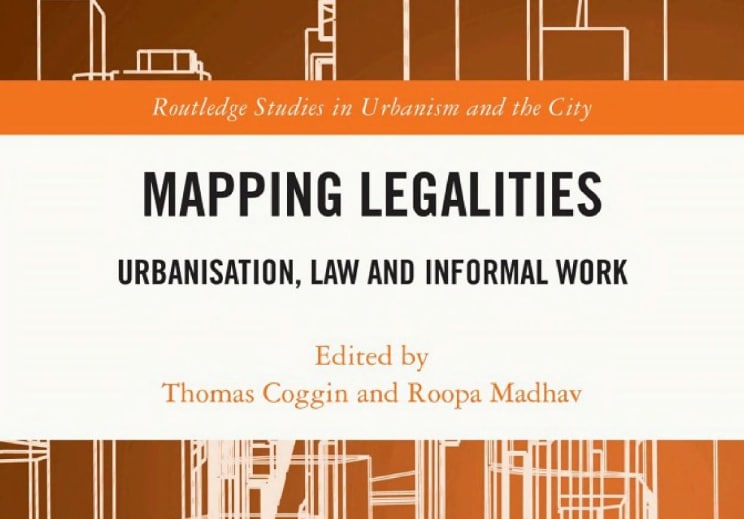Law shapes relations in public space, through a written and unwritten ‘script’ that tries to impose order, flow, and predictability in the way things run. Workers in informal employment come up against this script daily. Understanding how they navigate it is critical, if we are to support them reshape it in ways that can improve their livelihoods.
Mapping Legalities: Law, Urbanisation, and Informal Work, published in July 2024 by Routledge and edited by Dr Thomas Coggin and Dr Roopa Madhav, a consultant with WIEGO’s Law Programme, presents rich evidence about the complexities of regulating urban work environments. The book is the result of a collaborative effort between WIEGO and the International Research Group on Law & Urban Space.
The volume brings together 28 authors, including a number from WIEGO. Covering 15 jurisdictions around the world, the book examines diverse sectors, such as street vending, gig economy work, and waste picking. A common thread is the need for workers to access physical space. The chapters reveal the punitive ways law regulates the space that workers rely on for their livelihoods.
The authors spotlight gaps and weaknesses in different legal systems. As Caroline Skinner, WIEGO’s Urban Policies Programme Director, writes in the foreword: together this “powerfully explodes the myth that the law is ‘neutral’, showing how legal governance shapes livelihood possibilities but also manifests in space, adding a critical urban spatial analysis to existing legal scholarship.”
The authors highlight a number of ways to reshape legal governance to achieve spatial justice for workers in informal employment. Key elements include:
- Flexible legal frameworks: Developing laws that recognise informal work, remove barriers to their livelihoods, and provide for plural governance arrangements.
- Inclusive policy-making: Involving workers in creating laws and policies that affect them, to ensure they offer practical support to meet their real needs.
- Supportive infrastructure: Investing in infrastructure, like designated vending areas, sanitation, and transport access.
The various chapters point to a range of underlying dynamics that sustain the status quo – such as ambiguous legal frameworks, which grant rights in a partial or incomplete way; discriminatory social norms and intersecting inequalities, which mean legal reforms affect workers differently; and implementation challenges. But they also highlight promising developments that seek to shift these dynamics, including:
- Worker-led advocacy strategies grounded in rights claims.
- Using governments’ political commitments, such as the UN Habitat’s New Urban Agenda and ILO’s Recommendation No. 204 on the transition from the informal to the formal economy, to open up space for negotiation.
- Successful examples of inclusive, ‘bottom-up’ planning processes, such as the citizens’ campaign for a ‘livelihood centric’ approach to master planning in Delhi, India, shared by Malavika Narayan, Shalini Sinha and Avi Singh Majithia.
- Legal empowerment initiatives to help workers strengthen their demands for access to public space and infrastructure.
- Linking concepts like a city’s ‘social function’ and the principle of ‘commoning’, to challenge dominant narratives about how cities should look.
The book aligns with, and pushes forward, WIEGO’s priorities in a number of ways. First, it encourages cross-disciplinary thinking, which, in turn, opens up possibilities for alliance building. Second, it brings a strong political economy lens to the law. Third, and most critically, it allows us to learn from worker organisations’ advocacy strategies and explore the kind of support that could strengthen their efforts.
“At a time when cities are at the frontlines of both the effects of, and responses to, widening socioeconomic inequalities and a changing climate, pushing the boundaries of thinking, practice, and support for informally employed urban workers is more critical than ever. The book makes an important contribution to doing so”, emphasized WIEGO’s Law Programme Director, Allison Corkery, at a launch of the book at the University of Witwatersrand in Johannesburg, South Africa.
